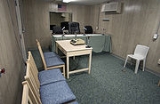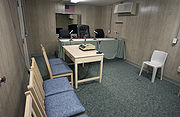
Juma Din
Encyclopedia
Juma Din is a citizen of Afghanistan
who was held in extrajudicial detention
in the United States
Guantanamo Bay detainment camp
s, in Cuba
.
Din's Guantanamo Internment Serial Number was 941.
American intelligence analysts estimate Juma Din was born in 1973, in Alinghan, Afghanistan.
Juma Din was transferred to Afghanistan on September 28, 2007.
 Initially the Bush administration asserted that they could withhold all the protections of the Geneva Conventions
Initially the Bush administration asserted that they could withhold all the protections of the Geneva Conventions
to captives from the war on terror. This policy was challenged before the Judicial branch. Critics argued that the U.S. could not evade its obligation to conduct a competent tribunal
to determine whether captives are, or are not, entitled to the protections of prisoner of war
status.
Subsequently the Department of Defense
instituted the Combatant Status Review Tribunal
s. The Tribunals, however, were not authorized to determine whether the captives were lawful combatants -- rather they were merely empowered to make a recommendation as to whether the captive had previously been correctly determined to match the Bush administration's definition of an enemy combatant
.
Din chose to participate in his Combatant Status Review Tribunal.
was prepared for
Juma Din's
Combatant Status Review Tribunal,
on 7 October 2004.
The memo listed the following allegations against him:
was prepared for his first annual Administrative Review Board on August 15, 2005.
The following primary factors favor continued detention
The following primary factors favor release or transfer
was prepared for his second annual Administrative Review Board on May 2, 2006.
The following primary factors favor continued detention
The following primary factors favor release or transfer
Juma Din's Assisting Military Officer reported on his responses to the
factors during the unclassified session of his Board hearing.
Other captives who didn't attend their hearings,
but whose
Assisting Military Officers reported their answers to the factors to their Boards, had a transcript from their unclassified sessions released.
The Department of Defense has not explained why the report of Juma Din's Assisting Military Officer remains secret.
The Board's recommendation was unanimous
The Board's recommendation was redacted.
England authorized his transfer on November 15, 2006.
Afghanistan
Afghanistan , officially the Islamic Republic of Afghanistan, is a landlocked country located in the centre of Asia, forming South Asia, Central Asia and the Middle East. With a population of about 29 million, it has an area of , making it the 42nd most populous and 41st largest nation in the world...
who was held in extrajudicial detention
Extrajudicial detention
Arbitrary or extrajudicial detention is the detention of individuals by a state, without ever laying formal charges against them.Although it has a long history of legitimate use in wartime , detention without charge, sometimes in secret, has been one of the hallmarks of totalitarian states...
in the United States
United States
The United States of America is a federal constitutional republic comprising fifty states and a federal district...
Guantanamo Bay detainment camp
Guantanamo Bay detainment camp
The Guantanamo Bay detention camp is a detainment and interrogation facility of the United States located within Guantanamo Bay Naval Base, Cuba. The facility was established in 2002 by the Bush Administration to hold detainees from the war in Afghanistan and later Iraq...
s, in Cuba
Cuba
The Republic of Cuba is an island nation in the Caribbean. The nation of Cuba consists of the main island of Cuba, the Isla de la Juventud, and several archipelagos. Havana is the largest city in Cuba and the country's capital. Santiago de Cuba is the second largest city...
.
Din's Guantanamo Internment Serial Number was 941.
American intelligence analysts estimate Juma Din was born in 1973, in Alinghan, Afghanistan.
Juma Din was transferred to Afghanistan on September 28, 2007.
Combatant Status Review Tribunal

Geneva Conventions
The Geneva Conventions comprise four treaties, and three additional protocols, that establish the standards of international law for the humanitarian treatment of the victims of war...
to captives from the war on terror. This policy was challenged before the Judicial branch. Critics argued that the U.S. could not evade its obligation to conduct a competent tribunal
Competent tribunal
Competent Tribunal is a term used Article 5 paragraph 2 of the Third Geneva Convention, which states:-ICRC commentary on competent tribunals:...
to determine whether captives are, or are not, entitled to the protections of prisoner of war
Prisoner of war
A prisoner of war or enemy prisoner of war is a person, whether civilian or combatant, who is held in custody by an enemy power during or immediately after an armed conflict...
status.
Subsequently the Department of Defense
United States Department of Defense
The United States Department of Defense is the U.S...
instituted the Combatant Status Review Tribunal
Combatant Status Review Tribunal
The Combatant Status Review Tribunals were a set of tribunals for confirming whether detainees held by the United States at the Guantanamo Bay detention camp had been correctly designated as "enemy combatants". The CSRTs were established July 7, 2004 by order of U.S. Deputy Secretary of Defense...
s. The Tribunals, however, were not authorized to determine whether the captives were lawful combatants -- rather they were merely empowered to make a recommendation as to whether the captive had previously been correctly determined to match the Bush administration's definition of an enemy combatant
Enemy combatant
Enemy combatant is a term historically referring to members of the armed forces of the state with which another state is at war. Prior to 2008, the definition was: "Any person in an armed conflict who could be properly detained under the laws and customs of war." In the case of a civil war or an...
.
Din chose to participate in his Combatant Status Review Tribunal.
Witness request
Juma Din requested the testimony of his uncle, Mohammed Rasol. The Tribunal ruled that his uncle’s testimony would be “relevant”, and requested the US State Department to request the Afghanistan embassy to request the Afghan civil service to locate Rasol “on or about October 28, 2004”. After waiting approximately one month the Tribunal’s President ruled Rasol’s testimony “not reasonably available”.Summary of Evidence memo
A Summary of Evidence memoSummary of Evidence (CSRT)
Counter-terrorism analysts prepared a Summary of Evidence memo for the Combatant Status Review Tribunals of the 558 captives who remained in the Guantanamo Bay detention camps, in Cuba in the fall of 2004.-The 2005 release:...
was prepared for
Juma Din's
Combatant Status Review Tribunal,
on 7 October 2004.
The memo listed the following allegations against him:
First annual Administrative Review Board hearing
A Summary of Evidence memoSummary of Evidence (ARB)
Counter-terrorism analysts prepared a Summary of Evidence memo for the Administrative Review Board hearings of approximately 460 captives in the Guantanamo Bay detention camps, in Cuba from December 2004 to December 2005.-Release of the memos:...
was prepared for his first annual Administrative Review Board on August 15, 2005.
The following primary factors favor continued detention
The following primary factors favor release or transfer
Second annual Administrative Review Board hearing
A Summary of Evidence memoSummary of Evidence (ARB)
Counter-terrorism analysts prepared a Summary of Evidence memo for the Administrative Review Board hearings of approximately 460 captives in the Guantanamo Bay detention camps, in Cuba from December 2004 to December 2005.-Release of the memos:...
was prepared for his second annual Administrative Review Board on May 2, 2006.
The following primary factors favor continued detention
The following primary factors favor release or transfer
Transcript
There is no record that Juma Din chose to participate in his second annual Administrative Review Board hearing.Juma Din's Assisting Military Officer reported on his responses to the
factors during the unclassified session of his Board hearing.
Other captives who didn't attend their hearings,
but whose
Assisting Military Officers reported their answers to the factors to their Boards, had a transcript from their unclassified sessions released.
The Department of Defense has not explained why the report of Juma Din's Assisting Military Officer remains secret.
Board recommendations
In early September 2007 the Department of Defense released two heavily redacted memos, from his Board, to Gordon England, the Designated Civilian Official.The Board's recommendation was unanimous
The Board's recommendation was redacted.
England authorized his transfer on November 15, 2006.

